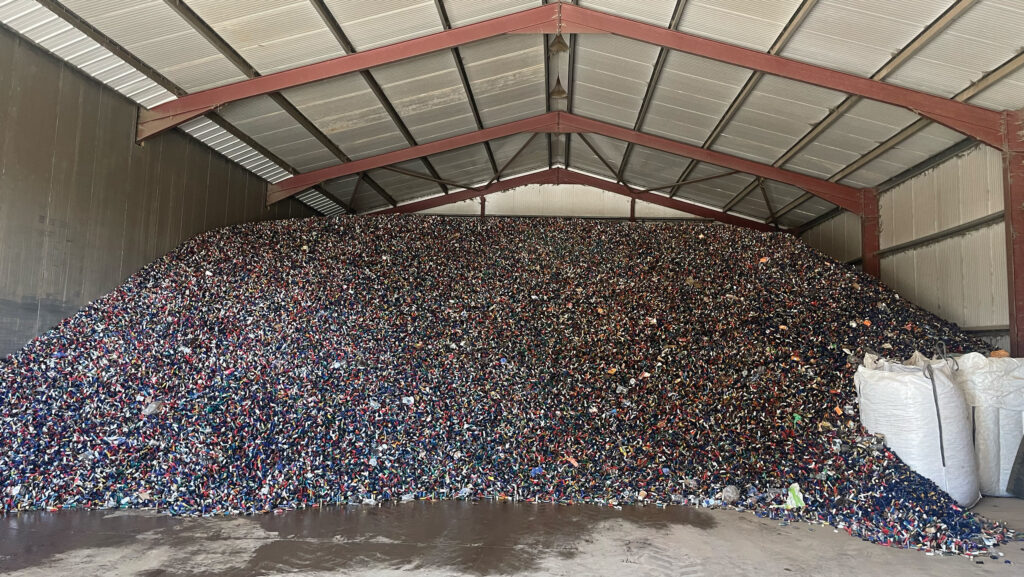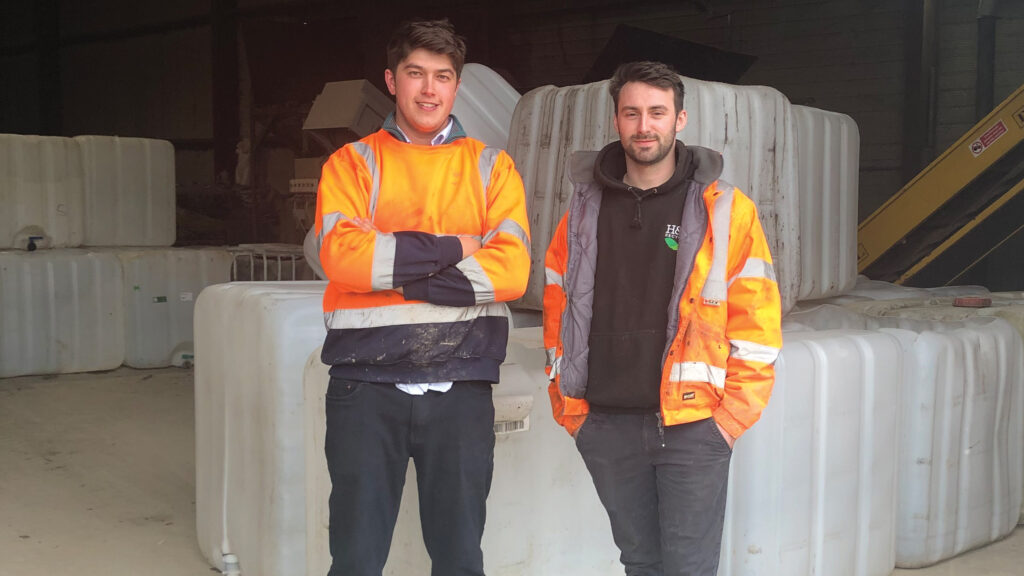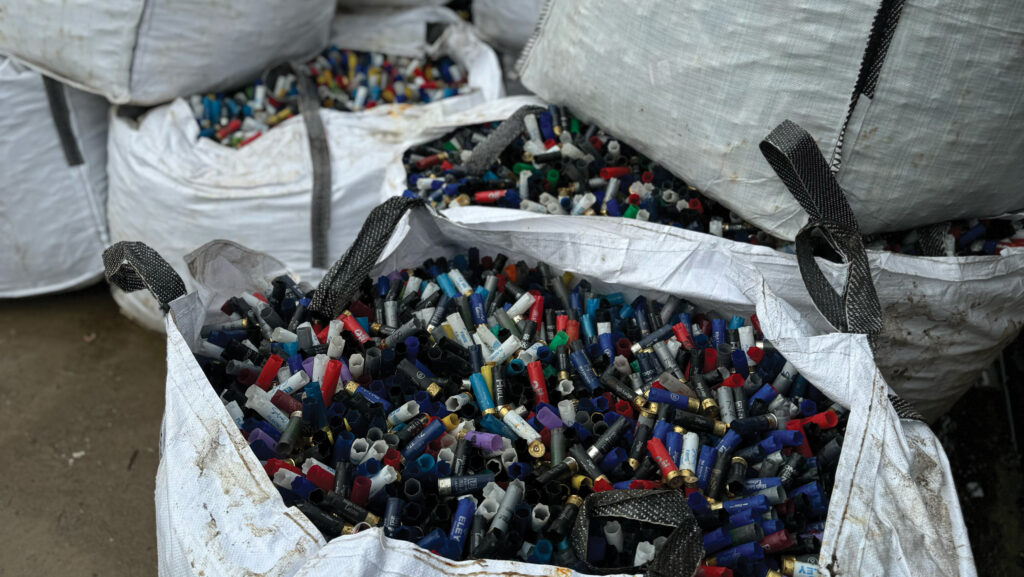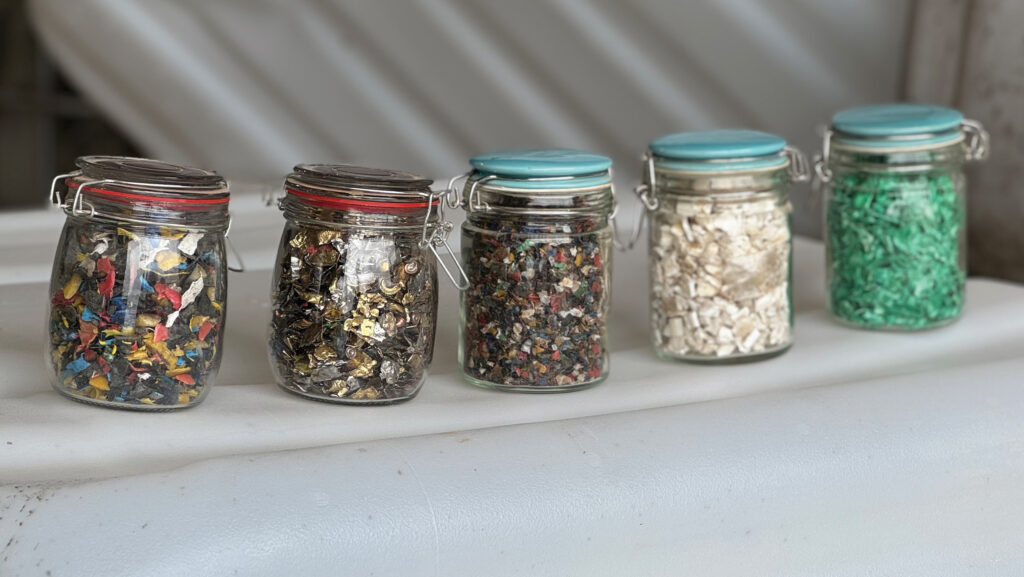Farm recycling sideline grows into full-time enterprise
 Shotgun cartridges for shredding © Henry Harrison
Shotgun cartridges for shredding © Henry Harrison Henry Harrison and Edward Medforth launched H&M Recycling four years ago to provide a service for farm plastics.
They began by baling polypropylene fertiliser and seed bags, also taking polyethylene chemical drums and some cardboard.
Both are still involved in their families’ respective businesses, but the new venture is now a full-time enterprise, aside from harvest when Henry is back on his family’s East Yorkshire arable farm until drilling finishes in mid-October.
See also: Stricter rules on firewood sales – what you need to know
Edward’s family farm is based on arable and B&B pigs, and he works there when needed, mainly for the game shoot and a driven clay diversification, both important elements of the business.

Edward Medforth (left) and Henry Harrison © MAG/Suzie Horne
“We both wanted a business that was separate from our family enterprises,” says Edward.
They formed H&M Recycling as a limited company and self-funded the start-up of the business, aiming to start small. The company is owned 50:50 by Edward and Henry.
Farm plastics gave them an entry into a very competitive market.
They keep costs low by inviting farmers to drop off their waste plastics rather than H&M collecting and charging for the service.
Initially they were both working full-time in their family businesses and spending their weekends and evenings, including some very late nights, at the recycling start-up.
Turnover in the first year was just a few thousand pounds but has grown rapidly every year since.
VAT registration soon followed, as the business grew and it became more important to be able to reclaim input tax on items such as machinery and haulage, as well as charging VAT on their products.

© Henry Harrison
Shredder investment
Once the farm plastics side was established, they looked to branch out into other materials and went to trial a shredder, taking some spent shotgun cartridges along.
The shredder did a fine job on those, and H&M recycling invested in one of these machines in 2021.
They used hire-purchase finance – their only borrowing – for the £50,000 cost of the shredder, which will be paid off over three years.
This is the only major new piece of equipment, with costs being kept low elsewhere by using second-hand farm machinery where possible.
“We cost our own time so we know what our true margins are, but we put pretty much everything back into the business,” says Henry, who manages the books and the waste licences, as well as working in the plant.
While there is plenty of competition in the farm recycling sector, only one other operator handles shotgun cartridges.
Henry and Edward reckon their business processes about 78% of spent shells from the clay shooting clubs of England and Wales.
Edward’s competitive clay shooting career gave them an entry to this market. He made the England junior team in 2014 and for several years following that.
He then qualified for the Great Britain team, shooting his first junior world cup in Germany, again making the team several times including for the European and world championships, taking him to many countries, from Russia to Australia.
“Shooting all over the UK in competitions meant that when we started to recycle cartridges, I felt like we had a head start with the clay shoot grounds because I knew many of them on a personal level,” he says.

© Henry Harrison
Rapid expansion
The cartridge side took off rapidly and the pair reckon they have now shredded more than 145m spent shells.
“Wagon after wagon of shotgun shells started coming through the door, and we were working at home through the day,” says Edward.
“We would then work well into the early hours to shred the cartridges. They were piled up like wheat or barley.”
The spent cartridges are a steady, year-round supply. “We have a flexible and good working agreement with our suppliers on haulage and transport costs, depending on where grounds are based” he says.
“Ultimately we want to offer a quality, reliable recycling service but we want to make money from the plastic and other recyclable materials, not from the shooting grounds or farmers themselves.”
Now in their fourth trading year, they are looking to expand both financially and physically.
The farm waste side now includes livestock slats and irrigation pipes.
They also shred IBCs, supermarket crates, plastic pallet boxes and wheelie bins, and have more recently handled rigid plastic skip waste.
A full-time employee was taken on in May 2023 and a part-time worker joined the team recently.
H&M Recycling’s customers process the plastic flake into a wide range of products, including garden furniture, underground drainage pipes and road construction material.
Challenges of a new market
With many alternative enterprises – such as tourism and liveries – there is a clear pattern, with costs and charges that are relatively straightforward to discover.
“With a business like this, there’s no road map or blueprint, you have to make your own path,” says Edward.
“Our farming experience was one of routine – plough, drill, harvest, plough and drill again – but this was something quite different and unpredictable.
“We entered this market when it was at a relatively high price point, just as the government was announcing the implementation of a plastic tax on packaging, which was good in some ways, but prices have come back down since then, and are now at their lowest.”
Henry says the main thing when going into a new business sector is to know what you are aiming for and to research the market well.
Their research included meeting potential suppliers and customers, asking as many questions as possible to get a better understanding of the sector. Face-to-face meetings were important.
“Ed and I knew absolutely nothing about the waste industry before starting H&M but have learned so much in the last four years and we’re still learning every day.
“We have a long-term business plan but we constantly come up with new ideas, supply outlets, requests from existing customers and new product research.”
Shared aims
The pair share the same aim, which is to run a profitable business that is farming-related but entirely their own domain.
However, their approaches and skills differ, and this is a strength, they say.
For example, Edward is more risk-friendly than Henry, who says: “Sometimes Edward will say ‘I’ve got an idea’, and I’ll think ‘oh dear, here we go’ and then we’ll throw it around and sometimes I have to bring him back down to ground level.
“We complement each other and have a very good, open working relationship, the key to which is good communication.
“People often say you should never go into business with a friend. However, if you share the same passions and beliefs, and are both motivated, then why not give it a go?
“We have found that it’s exciting being your own boss. We make all the decisions, and when things go wrong it’s our own fault.
“We have plenty of bad days, but we always try and have a laugh.
“We’re trying to create a new, friendly, hassle-free, affordable service for farmers.
“Often, when something new comes along, farmers will like to give it a go, especially if their neighbours decide to do so.
“Our farming connections and word of mouth have been important in establishing the business.”
Risks
Their main risk is competition, alongside a market that can be volatile. Also, attitudes to plastics and recycling are subject to a certain amount of greenwashing, says Henry, which could reduce the volume of plastic used in future.
“The biggest risk you can take is to not take the risk at all. With every bad day there will always be a good one just around the corner, and those are the days which motivate you to keep pushing along.”
Next steps
Henry and Edward now want to expand the farm waste side of the business.
“We are looking to take this section of the business to the next level by upping the total tonnage recycled each year,” says Edward.
“We also want to produce a cleaner end-product, which in turn will add to its overall value.”
The next step will be to invest in equipment to wash the shredded product, which they are currently appraising.
Tips on starting a new venture with no blueprint
- Research the market carefully
- Start small
- Invest what you are willing to lose
- When expanding, try to do so in sensible steps without stretching the new business too far and starving yourself financially
- Depending on the venture, use secondhand kit where possible – in this case farm equipment was much cheaper than specialised kit for the recycling market which carries a high mark-up and is often essentially the same kit, produced by the same manufacturers
- Be flexible – while sticking to your plan is usually a positive, opportunities may arise which take you in a different direction. In H&M’s case the rapid expansion of the cartridges side was challenging but successful.
